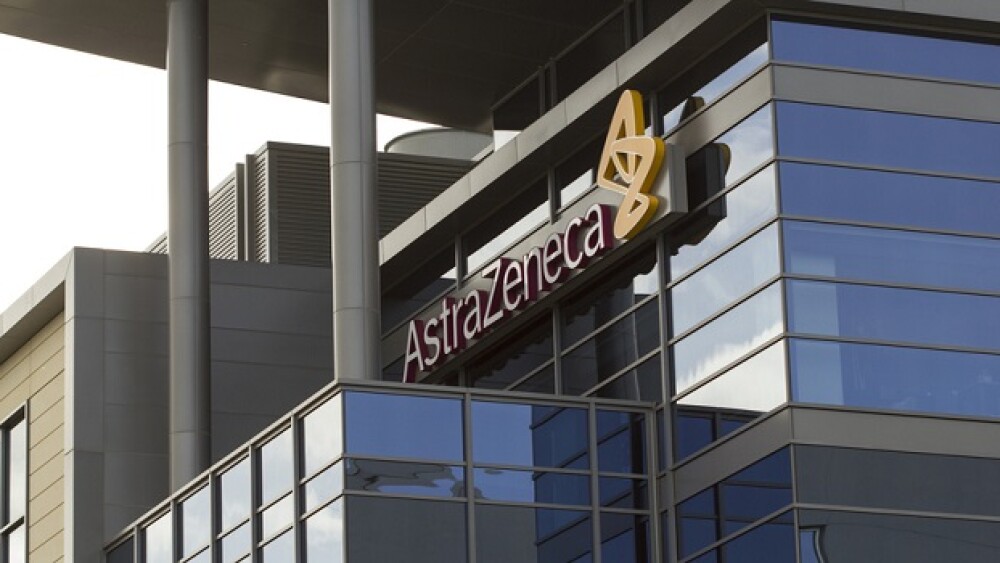Following in the footsteps of Bristol Myers Squibb and Eli Lilly, AstraZeneca on Tuesday jumped into the radiopharmaceuticals space by acquiring Fusion Pharmaceuticals in a deal worth $2.4 billion.
Pictured: AstraZenca’s office in South San Francisco, California/iStock, hapabapa
AstraZeneca announced on Tuesday that it is acquiring Fusion Pharmaceuticals in a deal potentially worth up to $2.4 billion to bolster its cancer portfolio in the hot radiopharma oncology space.
Under the agreement, AstraZeneca will buy all of Fusion’s outstanding shares for $21 apiece in cash, yielding a total deal value of approximately $2 billion. The purchase price represents a 97% premium to Fusion’s closing market price on Monday. AstraZeneca is also adding a contingent value right of $3 per share, payable after achieving an undisclosed regulatory milestone.
Including the maximum potential contingent value payments, the acquisition value could reach up to $2.4 billion, which would be a 126% premium to Fusion’s closing price on Monday.
Fusion CEO John Valliant said in a statement that the acquisition will combine “Fusion’s expertise and capabilities in radioconjugates” with AstraZeneca’s “leadership in small molecules and biologics engineering.” The main goal of the deal is to develop next-generation radioconjugate therapies “with the aim of transforming patient outcomes.”
The partners expect to close the transaction in the second quarter of 2024, pending the approval of Fusion’s shareholders and other customary closing conditions. Once the transaction has been completed, Fusion will operate as a wholly owned subsidiary of AstraZeneca.
At the core of the acquisition is Fusion’s lead radioconjugate program FPI-2265, which is being developed for metastatic castration-resistant prostate cancer (mCRPC). According to the biotech’s website, FPI-2265 targets the prostate-specific membrane antigen (PSMA), which is typically expressed in prostate cancer cells.
FPI-2265 carries actinium-225, a radioisotope that emits alpha particles as it degrades, causing irreparable damage to the targeted cancer cell. Fusion is currently running a Phase II clinical trial testing FPI-2265 in mCRPC patients with documented progressive disease.
In addition to FPI-2265, Fusion is also advancing the anti-IGF-1R FPI-1434 and the small molecule radioconjugate FPI-2059. Both are actinium-based radiopharmaceuticals and are being trialed for solid tumors.
By acquiring Fusion, AstraZeneca follows in the footsteps of fellow industry heavy-hitters Eli Lilly and Bristol Myers Squibb, which in recent months have also made hefty investments in the radiopharma space.
In October 2023, Lilly dropped $1.4 billion to acquire Point Biopharma and its pipeline of radioligand assets including PNT2002, which like FPI-2265 also targets PSMA and is being studied for mCRPC. Unlike Fusion’s candidate, however, PNT2002 uses the beta-emitting radioisotope lutetium-177.
BMS in December 2023 committed a net of $3.6 billion to buy RayzeBio and its potential first-in-class and best-in-class actinium-based radiotherapeutics. RYZ101, its most mature program, targets SSTR2 and is being developed for gastroenteropancreatic neuroendocrine tumors and non-small cell lung cancer.
For AstraZeneca, Tuesday’s acquisition of Fusion follows soon after it bought rare disease player Amolyt Pharma for $1.05 billion, gaining access to the biotech’s late-stage hypoparathyroidism candidate eneboparatide, which activates the parathyroid hormone receptor 1. Eneboparatide is currently in a Phase III study with topline data expected by the end of the year.
Tristan Manalac is an independent science writer based in Metro Manila, Philippines. Reach out to him on LinkedIn or email him at tristan@tristanmanalac.com or tristan.manalac@biospace.com.






